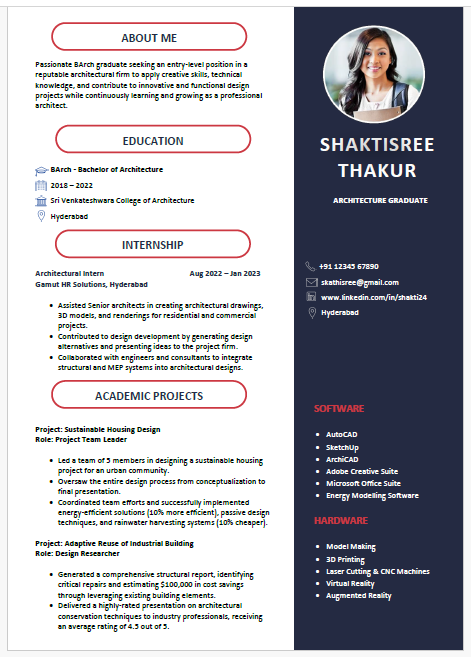Architectural Designer
BArch - Bachelor of Architecture

About this template
This is a very simple and professional resume which can effectively highlight your skills and experiences in a clear and concise manner.
This is a very professional resume which can significantly enhance your job prospects. With its clean, modern design and industry-tailored layout, it highlights your skills and achievements, making a strong impression on recruiters.
Some important and useful technical skills for Architectural Designer
Architectural designers require a diverse set of technical skills to create functional, aesthetically pleasing, and structurally sound buildings. Here are ten important and useful technical skills for an architectural designer:
1. Architectural Design Software:
Proficiency in design software such as AutoCAD, Revit, and SketchUp is essential for creating detailed architectural drawings and 3D models. These tools help architectural designers visualize and refine their designs, ensuring accuracy and clarity in their work.
2. Building Information Modeling (BIM):
Expertise in BIM software, like Revit or ArchiCAD, allows designers to create comprehensive digital models of buildings. BIM facilitates better collaboration, design coordination, and management of building data throughout the project lifecycle.
3. Structural Analysis:
Understanding structural principles and using structural analysis software is crucial for ensuring that designs are safe and viable. Architectural designers must collaborate with structural engineers to integrate load-bearing elements effectively into their designs.
4. Sustainable Design Practices:
Knowledge of sustainable design and green building practices is important for creating environmentally friendly and energy-efficient buildings. Designers use principles like passive solar design and LEED certification standards to reduce a building’s environmental impact.
5. Building Codes and Regulations:
Familiarity with local building codes, zoning laws, and regulations is essential for ensuring that designs comply with legal requirements. Architectural designers must incorporate these standards into their designs to ensure safety and regulatory compliance.
Conclusion:
These technical skills enable architectural designers to create innovative and practical designs while ensuring that they meet client expectations and adhere to industry standards.